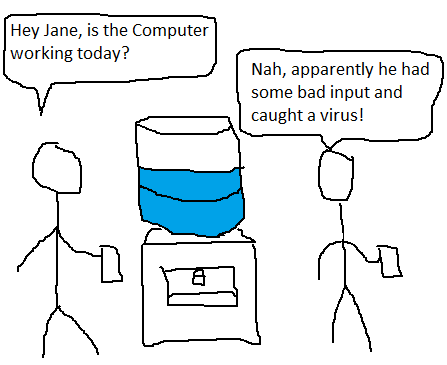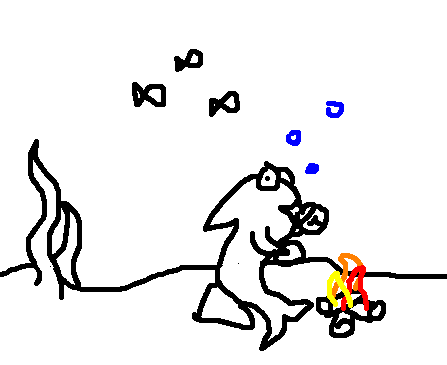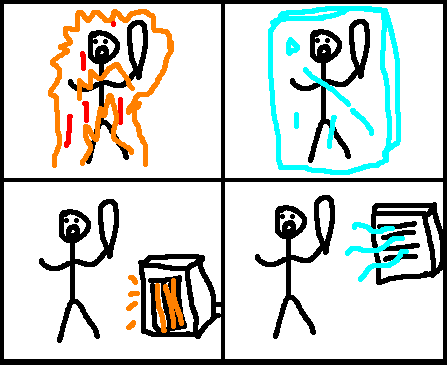In the beginning...
Before there were "smart" phones and "smart" televisions, there were "smart" people.
Humans have used the materials around us to help us perform calculations throughout the centuries!
While most might not consider their phone or TV to be a computer, fewer still would think of a person as a computer. Yet this was true before metal and plastic did the job; your job title would literally be "Computer".

(insert drum-roll)
Colloquially, a computer is a machine with a processor and a form of temporary and permanent storage, but breaking the word down, a "computer" is simply something that preforms computations, and for thousands of years that was a job done by humans; with our hands, sticks and stones.

Before we start getting into the weeds of when the slide rule came on the scene and changed the world, we need to ask a very fundamental question: why?
Why do we even need computers? Modern or otherwise. Why do we need them?
Answer: time!
You might have thought companionship, or accuracy, but as you'll come to find, computers aren't actually that accurate, and even with modern technology, computers are only as accurate as humans instruct them to be.
If your calculations are wrong, that time spent cannot be recovered...
Thus, having a calculation take less time, wrong or right, increases the amount of time you can use to pursue other things, like designing more algorithms!!
THERE'S MORE!!!!!!
So we understand that computers allow for quicker calculations, but what does that have to do with the price of tea under the sea?

Computers, even at a basic level, have allowed for humans to communicate across the globe and even to the Moon! They have allowed for cooling and heating that's incredibly efficient (and less lethal) when you compare it to a snow pack or an open flame.

In the grand scheme of things, computers, much like a fan, phone, or even indoor plumbing, are not absolutely necessary for the continuance of the functions of life, but they do make said functions of life well more convenient, and even enjoyable, than if we did not have them!
Food for thought:
Dinosaurs existed for 135 million years; that's 135,000,000 years. We can't know exactly what happened with the dinosaurs, nor can we know exactly how they lived, but we do know that they lived basically the same as any wild animal would.
So for 135 million years, the majority of life-forms were pretty much just "meh".

Then, humans came along.
In our current incarnation, we've been around for roughly 200,000 years; that is 2 hundred thousand. Not even 1/4 of 1 million! It's such a small number that it's shorter to write it as a numerical value than a text value: length of the number value, 7 characters with the comma; length of the text value, 18 characters...
135 million .. "meh" ..
200,000 years, and 20,000 years ago we figured out the concept of time.
In the last 5,000 years we invented the idea of Math and all that goes with that.
In the last 1,000 years we've figured out the orbits using new math and a lot of measuring.
In the last 500 years we've figured out how to control the physical universe and materials around us.
In the last 100 years we've figured out how to create boundless energies at the macro and micro levels.
In the last 80 years we've figured out how to control the boundless energies at a level that can be built by human hands.
In the last 60 years we've figured out how to manipulate the controlled energy on the fly.
In the last 30 years we've connected other humans and enabled access to information like never before.
What will we do in the next 100 years?
Before there were "smart" phones and "smart" televisions, there were "smart" people.
Humans have used the materials around us to help us perform calculations throughout the centuries!
While most might not consider their phone or TV to be a computer, fewer still would think of a person as a computer. Yet this was true before metal and plastic did the job; your job title would literally be "Computer".

(insert drum-roll)
Colloquially, a computer is a machine with a processor and a form of temporary and permanent storage, but breaking the word down, a "computer" is simply something that preforms computations, and for thousands of years that was a job done by humans; with our hands, sticks and stones.

Before we start getting into the weeds of when the slide rule came on the scene and changed the world, we need to ask a very fundamental question: why?
Why do we even need computers? Modern or otherwise. Why do we need them?
Answer: time!
You might have thought companionship, or accuracy, but as you'll come to find, computers aren't actually that accurate, and even with modern technology, computers are only as accurate as humans instruct them to be.
If your calculations are wrong, that time spent cannot be recovered...
Thus, having a calculation take less time, wrong or right, increases the amount of time you can use to pursue other things, like designing more algorithms!!
THERE'S MORE!!!!!!
So we understand that computers allow for quicker calculations, but what does that have to do with the price of tea under the sea?

Computers, even at a basic level, have allowed for humans to communicate across the globe and even to the Moon! They have allowed for cooling and heating that's incredibly efficient (and less lethal) when you compare it to a snow pack or an open flame.

In the grand scheme of things, computers, much like a fan, phone, or even indoor plumbing, are not absolutely necessary for the continuance of the functions of life, but they do make said functions of life well more convenient, and even enjoyable, than if we did not have them!
Food for thought:
Dinosaurs existed for 135 million years; that's 135,000,000 years. We can't know exactly what happened with the dinosaurs, nor can we know exactly how they lived, but we do know that they lived basically the same as any wild animal would.
So for 135 million years, the majority of life-forms were pretty much just "meh".

Then, humans came along.
In our current incarnation, we've been around for roughly 200,000 years; that is 2 hundred thousand. Not even 1/4 of 1 million! It's such a small number that it's shorter to write it as a numerical value than a text value: length of the number value, 7 characters with the comma; length of the text value, 18 characters...
135 million .. "meh" ..
200,000 years, and 20,000 years ago we figured out the concept of time.
In the last 5,000 years we invented the idea of Math and all that goes with that.
In the last 1,000 years we've figured out the orbits using new math and a lot of measuring.
In the last 500 years we've figured out how to control the physical universe and materials around us.
In the last 100 years we've figured out how to create boundless energies at the macro and micro levels.
In the last 80 years we've figured out how to control the boundless energies at a level that can be built by human hands.
In the last 60 years we've figured out how to manipulate the controlled energy on the fly.
In the last 30 years we've connected other humans and enabled access to information like never before.
What will we do in the next 100 years?